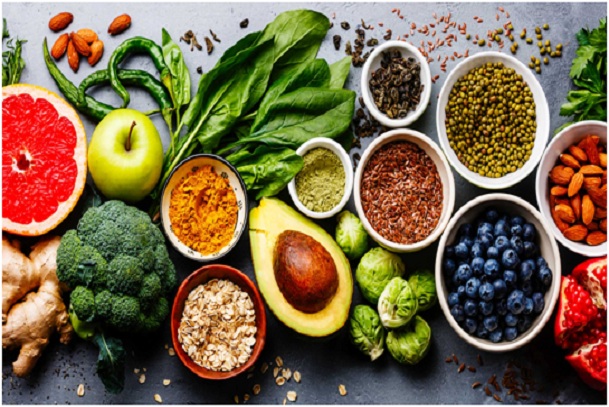 Wash your hands regularly and wear a face mask.
Learn more
Wash your hands regularly and wear a face mask.
Learn more

One of the biggest challenges facing people with diabetes is the struggle to find the right food combination that best suits their condition. In Nigeria, this problem is even fiercer as most of our common delicacies are packed with an unnecessary and usually unwanted amount of carbohydrates.
Meanwhile, the best foods for diabetic patients are supposed to be whole foods that are not processed such as fruits and vegetables. So in order to help you avoid foods that will trigger an increase in your blood sugar level, we have compiled a list of healthy food choices that can be sourced locally. These foods will help you meet your basic nutritional requirements and also lower the chances of diabetes complications such as heart diseases.
Note you don’t have to eat all of the foods listed below. However, incorporating some or all of them in your diabetes meal plan will help boost your overall health.
Walnuts are known to contain polyunsaturated fatty acids also called alpha-linolenic acids which have the ability to lower inflammation. Also, these magic nuts contain fiber, vitamin E, omega 3s, L-arginine, and other phytochemicals which enables them exact specific antioxidant, anticancer, antiviral, and anti-high cholesterol effects. These special abilities can help to stop or even reverse the progression of chronic conditions like heart diseases and diabetes.
Fish contains protein which will help you stay satisfied for longer periods. But most importantly, fish contains a special kind of fat that helps to keep inflammation in check. Studies have shown that people with a high level of omega-3 fatty acids tend to have less body-wide inflammation; the same inflammation that worsens weight and diabetes problems. Fish rich diets can potentially reduce the risk of developing stroke as a result of your diabetes.
Oatmeal is often ignored when it comes to making healthy food choices especially in this part of the world where “heavy meals” are the order of the day. Interestingly, oatmeal can reduce the risk of developing “type 2 diabetes” thanks to its unique nutritional composition. Oatmeal contains magnesium, which enhances the usage of glucose and the release of insulin.
Sweet potatoes retain a unique deep orange color brought about by powerful antioxidants known as anthocyanins. These anti-oxidants have anti-inflammatory, antimicrobial, and antiviral qualities.
Beans may seem like very little legumes, but they have very powerful nutritional qualities. This includes a unique blend of high-quality carbohydrates, lean protein, and soluble fiber that helps stabilize the blood’s sugar level and equally leaves you feeling satisfied for longer periods. This quality helps type 2 diabetes patients keep their blood sugar level low and reduce the risk of heart disease.
Spinach has long been known to reduce the risk of diabetes thanks to its rich blend of vitamins and essential minerals. This leafy green veggie is high in B-carotene; an essential anti-oxidant the body uses to manufacture vitamin A. Beta-carotene equally protects the cells of the body from free radical damage which brings about aging and chronic illnesses.
Eggs are a tremendous source of long-lasting protein, in most cases, they are a great alternative to many other types of meats. However, nutritional experts do recommend that diabetic patients limit their yolk intake to just three times in a week, but egg white can be consumed more often. Eggs are perfect for blood sugar control and the maintenance of a healthy body weight.
A Harvard study published in the British Journal of Medicine in 2013 showed that eating more whole fruits particularly apples, blueberries, grapes were significantly responsible for a lowered risk of type 2 diabetes in test subjects. People who ate at least two servings of whole fruit in a week reduced their risk of type 2 diabetes to as much as 23 percent when compared to those that ate less than two servings. However, eating the whole fruit was the only way to enjoy these benefits; fruit juice drinkers increased their risk of type 2 diabetes by as much as 21 percent.
Carrots are a great addition to any meal whether they are eaten raw or fresh. While cooked carrots may have a rich blend of starchy vegetables, they are still considered to be non-starchy veggies because they do not contain a lot of carbohydrates. Beta-carotene contained in carrot aids the manufacture of vitamin A in the body. Vitamin A serves as a major boost to vision and general immune system function.
Tomatoes are a rich source of vitamin A and C. They equally contain lycopene which is a powerful anti-oxidant. A consistent intake of lycopene-rich tomatoes significantly increases the body’s resistance against cancers like prostate cancer. This is also effective against other major heart diseases. Studies have shown that it is easier for the human body to absorb lycopene from cooked and processed tomatoes such as tomato juice than from freshly picked tomatoes. Also, canned tomatoes and other packaged forms of tomatoes contain two times more lycopene than raw tomatoes. Carotenoids and bioflavonoids nutritional contents of tomatoes help to fight against inflammation.